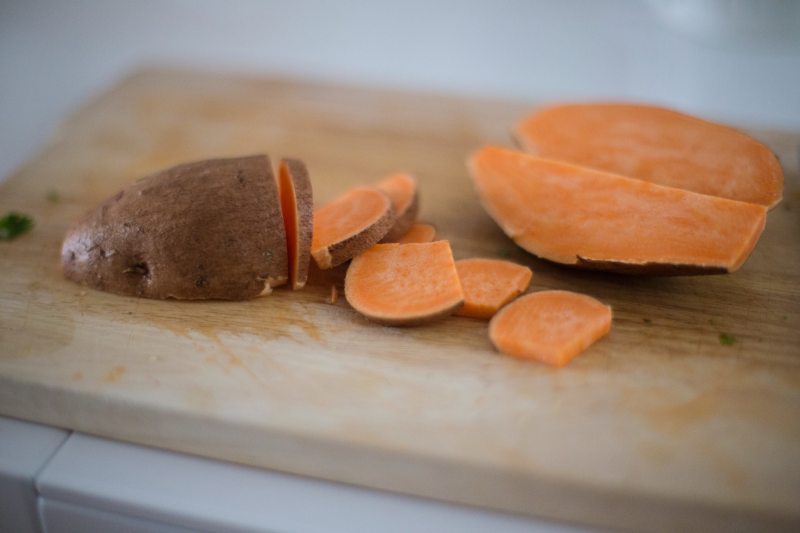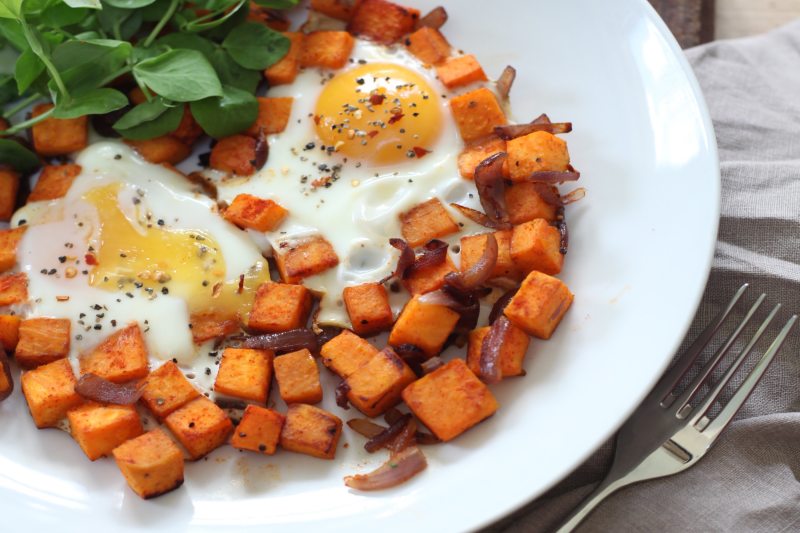
Sweet potatoes may just be one of nature’s greatest gifts, as they are one of the sweetest vegetables, versatile, and easy to cook. They go well with a wide variety of ingredients, and they can essentially be enjoyed at any time of day. Whether you prefer them as fries, in a stew, in a pie, or in a different recipe, rest assured that you get to enjoy the many benefits of sweet potatoes.
Read on to learn why sweet potatoes are so good for you (and remember this list the next time you pass a pile of these starchy little gems at the store).

What are sweet potatoes?
Sweet potatoes are often put in the same metaphorical bucket as root vegetables like carrots and beets, but they’re actually something called a root tuber. Root tubers, like sweet potatoes and cassava, are bulb-like portions of the root where plants stockpile extra nutrients to stay alive through winter.
Because they’re essentially nutrient silos, it’s no wonder sweet potatoes are packed with vitamins, minerals, and other beneficial compounds. They’re also completely different than yams. Though you might find them labeled interchangeably (i.e., incorrectly) in the produce aisle, true yams are blackish-brown on the outside, white or purple on the inside, and less sweet than a sweet potato.
The sweet potatoes you’re probably most familiar with have bright orange flesh. Still, they come in a wide variety of colors, from pink and purple to yellow and white (and in case you’re wondering, yes — white sweet potatoes are different than regular white potatoes). Since part of a plant’s nutrient profile depends on its color, each variety has a slightly different makeup, but all have the potential to benefit your health. Let’s dive more into why.

Why are sweet potatoes good for you?
The benefits of sweet potatoes all map back to their impressive nutritional profile, and including them in a well-rounded diet is a great way to support overall health. Here’s why we think so.
1. Sweet potatoes contain important vitamins
Sweet potatoes are perhaps most well known for their vitamin A content (actually present as beta-carotene, a plant pigment that gives sweet potatoes their orange color and that our bodies convert to vitamin A once we eat them). Still, they’re also a good source of vitamin C and vitamin B6. In fact, just one medium-sized baked sweet potato gives you more than 100% of the daily value of vitamin A, 25% of the daily value of vitamin C, and 19% of the daily value of vitamin B6. That’s a big nutritional bang for your buck!
2. Sweet potatoes provide essential minerals
Minerals are just as essential as vitamins. That same medium-sized sweet potato provides 25% of the daily value of manganese, 20% of the daily value of copper, and 12% of the daily value of potassium. Getting enough manganese is important for promoting bone health, producing sex hormones, and regulating blood sugar; copper helps our bodies with a variety of functions, such as making red blood cells, and potassium is essential for regulating fluid balance, contracting muscles, and maintaining healthy nerve function.
3. Sweet potatoes have complex carbs
Despite the popularity of ultra-low-carb diets, our bodies need adequate amounts of carbohydrates to survive because they’re our number one source of energy. But, while they’re all broken down into glucose in the end, not all carbs are created equal when it comes to their effect on blood sugar.
Sweet potatoes have something called complex carbohydrates, which means they take longer for your body to break down, leading to less of a spike in blood sugar and more sustained energy. That’s compared to simple carbohydrates, like the sugar used to make things like candy, pastries, and sugary drinks, which are digested very quickly and provide a quick but short-lived energy burst.
4. Sweet potatoes are good for gut health
Sweet potatoes are also a good source of fiber, which has been linked to a variety of benefits, from promoting heart health to lowering the risk of diabetes and certain types of cancer. Despite those impressive benefits, a staggering 9 out of 10 of us aren’t getting enough. That’s pretty shocking stuff.
Let’s talk about the fiber in sweet potatoes for gut health specifically, though. Not only does a sweet potato give you four grams of fiber (14% of what you need in a day based on the daily value), but it also gives you both types of fiber, insoluble and soluble.
Insoluble fiber promotes bowel regularity (another way of saying it can keep you from getting constipated). In contrast, the soluble fiber becomes fuel for the good bacteria in your gut, also known as your gut microbiome. Research suggests a healthy microbiome is linked to a lower risk of diabetes, less inflammation, and a variety of other benefits, and it’s never too late to start improving it. A recent study found just two weeks of a higher fiber diet was enough to see changes.
5. Sweet potatoes could help protect your vision
Orange sweet potatoes are one of the best whole food sources of beta-carotene you can find. Beta-carotene, that plant pigment our bodies convert to vitamin A, helps prevent dry eyes and keep you seeing well in the dark. Along with other carotenoids, it also acts as an antioxidant to protect eye cells from free radical damage and inflammation. Beta-carotene is fat-soluble, so it’s best absorbed when eaten with fat, like butter, olive oil, or avocado — great news since all go well with sweet potatoes.
6. Sweet potatoes may improve brain function
Antioxidants are thought to help prevent age-related declines in brain function and the risk of neurodegenerative conditions like Alzheimer’s and dementia, and sweet potatoes have several different kinds, including carotenoids and anthocyanins. Carotenoids like those found in orange sweet potatoes have been shown to slow cognitive decline (so they can keep you sharper, longer), while the anthocyanins in purple sweet potatoes have been found (in animal studies) to improve memory and learning.
7. Sweet potatoes could help your body fight free radicals
Antioxidants like those found in sweet potatoes also help you fight free radicals — unstable molecules our bodies make in response to things like tobacco smoke, air pollution, UV rays, and even exercise that can damage our DNA and cell membranes. Since free radicals are unavoidable, it’s important to get antioxidants from your diet, as antioxidants, by their very nature, counteract or neutralize free radicals to keep them from doing this damage. That said, an overdose of antioxidants can actually be harmful, so it’s best to get them from a varied diet rather than an antioxidant supplement.
8. Sweet potatoes can promote healthy skin and hair
Remember how sweet potatoes provide are rich in vitamin C? Vitamin C is essential for our bodies to make collagen, a protein found in the skin and hair (as well as in muscles, tendons, ligaments, and bones) that keeps them looking and feeling healthy. While the body’s production of collagen declines naturally as we age, getting enough vitamin C is important to keep it producing as much as it can. The vitamin A we get from sweet potatoes can benefit skin and hair, too, like keeping both from drying out.
9. Sweet potatoes can support your immune system
Vitamin C is also important to keep your immune system working in tip-top shape because it stimulates the production of white blood cells (our body’s infection fighters). If you remember, a sweet potato can give you 25% of the recommended daily value. While it might not keep you from ever getting a cold, research suggests it could shorten the duration a tad (and when we’re feeling under the weather, we’ll take any help we can get). Extra vitamin C isn’t stored very well in the body, so we need to get it from our diet (or supplements) every day.
10. Sweet potatoes could help you maintain a healthy weight
While there’s a chance you’ve been told to shy away from starchy vegetables, if you’re looking to lose weight, sweet potatoes (and other starchy vegetables like peas, squash, and corn) can absolutely be part of a nutritious, well-rounded diet for weight loss or maintenance. Sweet potatoes are quite filling, thanks to their complex carbohydrates and fiber, giving you sustained energy and a lasting sense of satisfaction.
They’re also nutrient-dense, which means that their nutrient-to-calorie ratio is a good one — lots of nutrients for comparatively few calories (around 100 calories per medium-sized baked sweet potato). That’s compared to foods that aren’t very nutrient-dense, like a piece of cake (little nutrients for a lot more calories — albeit a delicious taste).

Is it good to eat sweet potatoes every day?
Yes, it’s generally OK to eat sweet potatoes every day. As mentioned above, sweet potatoes are a healthy and nutritious food packed with vitamins, minerals, and antioxidants. They are a good source of fiber, vitamin A, vitamin C, potassium, and manganese.
However, it’s important to note that too much of a good thing may not be so good. Eating too many sweet potatoes can lead to weight gain, especially if you don’t eat them in moderation. Additionally, the high beta-carotene content in sweet potatoes can cause the skin to turn orange if eaten in excess.
So, how many sweet potatoes should you eat a day? A good rule of thumb is to eat one or two a day. This will give you the benefits of sweet potatoes without overdoing it. You can also vary your intake by eating different types of sweet potatoes, such as orange, white, and purple.
Here are some healthy ways to eat sweet potatoes:
- Roasted sweet potato wedges
- Sweet potato fries
- Sweet potato soup
- Sweet potato pancakes
- Sweet potato muffins
- Sweet potato pudding
No matter how you choose to eat them, sweet potatoes are a healthy and delicious way to add more nutrients to your diet.

Sweet potato recipes
Whether you choose to microwave them, bake them, fry them, boil them, mash them, sauté them, steam them, puree them, grill them, or roast them, sweet potatoes can be incorporated into a wide range of dishes with different flavor profiles. There’s no shortage of delicious sweet potato recipes!
Just know that certain cooking methods are better for retaining certain nutrients — for example, boiling sweet potatoes retains more beta-carotene and makes it easier to absorb, and cooking them with the skin on helps protect both beta-carotene and vitamin C.
So, now that you’re a sweet potato expert, pick some up and get to cooking!



